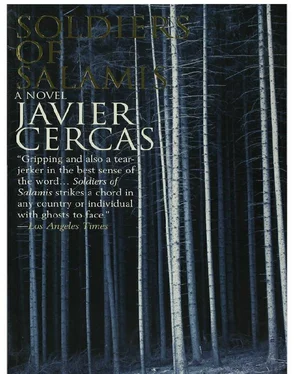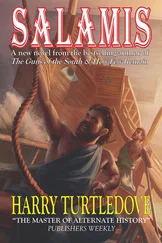I asked him if he'd heard anything about the 'forest friends'. He said he had. I asked who had told him the story he told in his book. He said Liliana Ferlosio, Sánchez Mazas' wife, whom it seemed he'd visited frequently before her death.
'It's odd,' I remarked. 'Except for one detail, the story coincides point by point with what Ferlosio told me — as if, instead of telling it, they'd both recited it.'
'Which detail is that?'
'A minor one. In your telling (in Liliana's, that is), when he sees Sánchez Mazas the militiaman shrugs his shoulders and then he walks away. In mine (in Ferlosio's, that is), before he leaves the militiaman looks him in the eye for a few seconds.'
There was a silence. I thought the line had gone dead.
'Hello?'
'It's funny,' Trapiello reflected. 'Now that you mention it, that's true. I don't know where I got the shrug of the shoulders, it must have struck me as more dramatic, or more like Pío Baroja. I think, in fact, Liliana told me the militiaman stared him in the eye before he left. Yes. I even remember her saying one time, when she was reunited with Sánchez Mazas after the three years of separation during the war, he often used to talk to her about those eyes that had stared at him. The militiaman's eyes, I mean.'
Before we hung up we talked a bit more about Sánchez Mazas, about his poetry and his novels and articles, his difficult personality, his friendships and his family ('In that house everyone speaks badly about everyone else, and they're all right,' Trapiello told me González-Ruano used to say). As if he took it for granted that I was going to write something about Sánchez Mazas, but out of some scruple of decency didn't want to ask me what, Trapiello gave me a few names and some bibliographic leads and invited me to come and see him in Madrid, where he had manuscripts and photocopies of newspaper articles and other things by Sánchez Mazas.
I didn't visit Trapiello until several months later, but I immediately began to follow up the leads he'd provided.
That's how I discovered that, especially right after the end of the war, Sánchez Mazas had indeed told everyone who'd listen the story of his firing squad experience. Eugenio Montes, one of the most faithful friends he had (a writer like him, like him a Falangist), on 14 February 1939, just two weeks after the events at Collell, described him 'in a shepherd's jacket and bullet-ridden trousers', arriving 'almost resurrected from the other world' after three years of hiding and jail cells in the Republican zone. Sánchez Mazas and Montes had been joyfully reunited a few days earlier in Barcelona, in the office of the then National Chief of Propaganda for the rebels, the poet Dionisio Ridruejo. Many years later, in his memoirs, he still recalled the scene, just as another illustrious young Falangist hierarch of the moment, Pedro Laín Entralgo, did in his, somewhat later. The descriptions the two memoir writers give of Sánchez Mazas — whom Ridruejo knew a little, but whom Laín, later to loathe him, had never seen before — are noticeably similar, as if they'd been so impressed that memory had frozen the image in a common snapshot (or as if Laín had copied Ridruejo; or they'd both copied the same source): for them too he had a resurrected air, skinny, nervous and disconcerted, his hair cropped close and his curved nose dominating the famished face; they both also remember Sánchez Mazas telling the firing squad story in that very office, but perhaps Ridruejo didn't entirely believe him (and thus mentioned the 'rather novelistic details' with which he adorned the tale for them); and only Laín hadn't forgotten he was wearing a 'rough, dark sheepskin'.
Because, as I found out by chance and, after a few unusually simple procedures, was able to verify sitting in a cubicle of the Catalan Filmoteca archives, Sánchez Mazas in that same rough dark sheepskin and with that same resurrected air — skinny and with close-cropped hair also told his firing squad story in front of a camera, undoubtedly around the same time in February 1939 when he'd told his Falangist comrades in Ridruejo's office in Barcelona. The film — one of the few remaining of Sánchez Mazas — appeared in one of the first post-war news broadcasts, among martial images of Generalisimo Franco reviewing the Armada at Tarragona and idyllic images of Carmencita Franco playing in the garden of their residence in Burgos with a lion cub, a gift from Social Welfare. Sánchez Mazas is standing throughout, not wearing his glasses, his gaze a little lost; he speaks, however, with the aplomb of a man accustomed to doing so in public, with the pleasure of someone who enjoys the sound of his own voice, in a tone strangely ironic at first — when he alludes to the execution — and predictably exalted at the conclusion — when he alludes to the end of his odyssey — always a bit bombastic, but his words are so precise and the silences which govern them so measured, that he too at times gives the impression that instead of telling the story he's reciting it, like an actor playing his part on stage; otherwise, the story doesn't differ substantially from the one his son recounted to me. . So as I listened to him tell it, sitting on a stool in front of a video player, in a Filmoteca cubicle, I couldn't suppress a vague tremor, because I knew I was hearing one of the first versions, still rough and unpolished, of the same story Ferlosio was to tell me almost sixty years later, and I felt absolutely sure that what Sánchez Mazas had told his son (and what he'd told me) wasn't what he remembered happening, but what he remembered having told before. Also I wasn't in the least surprised that neither Montes nor Ridruejo nor Laín (supposing they even knew of his existence), nor of course Sánchez Mazas himself in that news bulletin directed at a numerous and anonymous mass of spectators relieved by the recent end of the war, mentioned the gesture of that nameless soldier who had orders to kill him and did not kill him; the fact is understandable without need to attribute forgetfulness or ingratitude to anyone: suffice to remember that the doctrine of war in Franco's Spain, as in all wars, dictated that no enemy had ever saved anyone's life: they were too busy taking them. And as for the 'forest friends'. .
A few more months passed before I managed to speak to Jaume Figueras. After leaving several messages on his mobile phone and not receiving a single reply to any of them, I had almost given up hope that he'd get in touch with me, and on occasion surmised that he must be only a figment of Aguirre's overwrought imagination or, for reasons unknown but not difficult to imagine, that Figueras simply did not welcome the idea of recalling for anyone his father's wartime adventure. What is odd (or at least it strikes me as odd now) is that in all the time since Ferlosio's tale first awoke my curiosity, it never occurred to me that any of the story's protagonists could still be alive, as if the event had happened not a mere sixty years ago, but was as remote in time as the battle of Salamis.
One day I chanced to run into Aguirre. It was in a Mexican restaurant where I'd gone to interview a nauseating novelist from Madrid who was in the city promoting his latest flatulence, which took place in Mexico; Aguirre was with a group of people, celebrating something I imagine, as I can still remember their loud, jubilant laughter and his tequila breath hitting me in the face. He came over and, nervously stroking his bad-guy goatee, asked me pointblank whether I was writing (which meant whether I was writing a book: like almost everyone, Aguirre didn't consider writing for a newspaper actual writing); a little annoyed, because nothing irritates a writer who doesn't write as much as being asked about what he's writing, I said no. He asked me what had happened with Sánchez Mazas and my true tale; even more annoyed, I said: nothing. Then he asked me if I'd spoken to Figueras. I must have been a bit drunk too, or maybe the nauseating novelist from Madrid had already got me worked up, because I said no, and petulantly added:
Читать дальше












